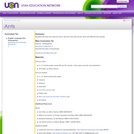
Students will read and observer ants to discover how ants are the same and different than people.
- Subject:
- Biology
- Life Science
- Material Type:
- Activity/Lab
- Lesson Plan
- Provider:
- Utah Education Network
- Date Added:
- 12/11/2013

Students will read and observer ants to discover how ants are the same and different than people.
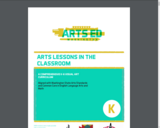
This creative start introduces concepts of line variety, geometric shape, actual texture, primary color, and pattern through exploratory drawing, painting, collage, and stamping. In literacy infused lessons, students make decorative letters, identify word sequence, analyze visual clues, and develop pictures by linking words and images.
The K-6 lesson handbooks were originally produced for the Lake Washington School District with grants from 4culture and ArtsWA. Encourage your colleagues, other schools, and organizations to use these materials for non-commercial, educational purposes at no cost by downloading their own copy at: http://artsedwashington.org/portfolio-items/alic-2
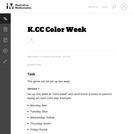
The purpose of this task is to help students understand the connection between counting and cardinality. Thus, oral counting and recording the number in digit form are the most important aspects of this activity. However, teachers can extend this by making a bar graph about how many students are wearing the color each day.
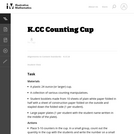
This activity allows students to practice counting.
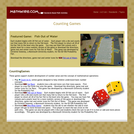
These games support student development of number sense and the concept of mathematical operations
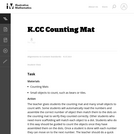
This task gives students another way to practice counting and gain fluency with connecting a written number with the act of counting. This task should be introduced by the teacher and would then be a good independent center.
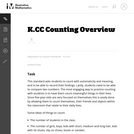
The most engaging way to practice counting with students is to have them count meaningful things in their lives. Since five-year-olds are very focused on themselves this is easily done by allowing them to count themselves, their friends and objects within the classroom that relate to their daily lives.
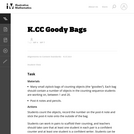
This task aims to give students practice counting and recording the given number on quantities up to 20.
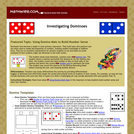
Dominoes have become a staple in most primary classrooms. They build upon dice patterns and are often used to model decomposition of numbers, building student knowledge of addition facts. They are an excellent manipulative for primary students to use and these are some examples of how students might use dominoes in the math center. Try these domino games with students to improve math skills and number recognition. Encourage students to play these games at home with their families, using real dominoes or paper copies.

This is a task from the Illustrative Mathematics website that is one part of a complete illustration of the standard to which it is aligned. Each task has at least one solution and some commentary that addresses important asects of the task and its potential use. Here are the first few lines of the commentary for this task: Material * Assorted objects to create the groups * Clear ziplock bags or small cups * Index cards and stickers * An egg timer or a kitchen timer Action...
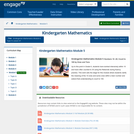
Up to this point in Grade K, students have worked intensively within 10 and have often counted to 30 using the Rekenrek during fluency practice. This work sets the stage for this module where students clarify the meaning of the 10 ones and some ones within a teen number and extend that understanding to count to 100.
Find the rest of the EngageNY Mathematics resources at https://archive.org/details/engageny-mathematics.
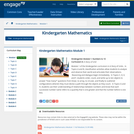
Module 1 of the Kindergarten curriculum in A Story of Units. In Topics A and B, classification activities allow students to analyze and observe their world and articulate their observations. Reasoning and dialogue begin immediately. In Topics C, D, E, and F, students order, count, and write up to ten objects to answer how many? questions from linear, to array, to circular, and finally to scattered configurations wherein they must devise a path through the objects as they count. In Topics G and H, students use their understanding of relationships between numbers and know that each successive number name refers to a quantity that is one greater and that the number before is one less.

Explore the Mathematics Student Choice Boards for PreK – 1st grade created by the Washington Office of Superintendent of Public Instruction.

This resource was created by the Washington Office of Superintendent of Public Instruction.
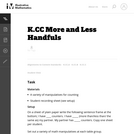
This counting activity is done in pairs and helps reinforce the concepts of greater than, less than, and equal to.

(Nota: Esta es una traducción de un recurso educativo abierto creado por el Departamento de Educación del Estado de Nueva York (NYSED) como parte del proyecto "EngageNY" en 2013. Aunque el recurso real fue traducido por personas, la siguiente descripción se tradujo del inglés original usando Google Translate para ayudar a los usuarios potenciales a decidir si se adapta a sus necesidades y puede contener errores gramaticales o lingüísticos. La descripción original en inglés también se proporciona a continuación.)
Módulo 1 del plan de estudios de jardín de infantes en una historia de unidades. En los temas A y B, las actividades de clasificación permiten a los estudiantes analizar y observar su mundo y articular sus observaciones. El razonamiento y el diálogo comienzan de inmediato. En los temas C, D, E y F, los estudiantes ordenan, cuentan y escriben hasta diez objetos para responder cuántas preguntas de lineal, a matriz, circular y finalmente a configuraciones dispersas en las que deben idear una ruta a través de los objetos como cuentan. En los temas G y H, los estudiantes usan su comprensión de las relaciones entre los números y saben que cada nombre de número sucesivo se refiere a una cantidad que es una mayor y que el número anterior es uno menos.
English Description:
Module 1 of the Kindergarten curriculum in A Story of Units. In Topics A and B, classification activities allow students to analyze and observe their world and articulate their observations. Reasoning and dialogue begin immediately. In Topics C, D, E, and F, students order, count, and write up to ten objects to answer how many? questions from linear, to array, to circular, and finally to scattered configurations wherein they must devise a path through the objects as they count. In Topics G and H, students use their understanding of relationships between numbers and know that each successive number name refers to a quantity that is one greater and that the number before is one less.

(Nota: Esta es una traducción de un recurso educativo abierto creado por el Departamento de Educación del Estado de Nueva York (NYSED) como parte del proyecto "EngageNY" en 2013. Aunque el recurso real fue traducido por personas, la siguiente descripción se tradujo del inglés original usando Google Translate para ayudar a los usuarios potenciales a decidir si se adapta a sus necesidades y puede contener errores gramaticales o lingüísticos. La descripción original en inglés también se proporciona a continuación.)
Hasta este punto en el Grado K, los estudiantes han trabajado intensamente dentro de 10 y a menudo han contado a 30 utilizando el Rekenrek durante la práctica de fluidez. Este trabajo prepara el escenario para este módulo donde los estudiantes aclaran el significado de los 10 y algunos dentro de un número adolescente y extienden esa comprensión para contar hasta 100.
Encuentre el resto de los recursos matemáticos de Engageny en https://archive.org/details/engageny-mathematics.
English Description:
Up to this point in Grade K, students have worked intensively within 10 and have often counted to 30 using the Rekenrek during fluency practice. This work sets the stage for this module where students clarify the meaning of the 10 ones and some ones within a teen number and extend that understanding to count to 100.
Find the rest of the EngageNY Mathematics resources at https://archive.org/details/engageny-mathematics.
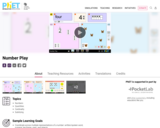
Number Play from PhET is a sim for some of our earliest learners and includes multilingual support. This sim can be used to teach topics such as counting, cardinality, grouping, and subitizing. Students will enjoy interacting with fun objects and challenging themselves with the counting and subitizing games.
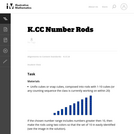
This activity gives students practice counting for meaning.
![OREGON MATH STANDARDS (2021): [K.NCC]](https://img.oercommons.org/160x134/oercommons/media/courseware/lesson/image/13138_ODE_Math_Logo_2018-H_color_BvjqVNy.png)
The intent of clarifying statements is to provide additional guidance for educators to communicate the intent of the standard to support the future development of curricular resources and assessments aligned to the 2021 math standards. Clarifying statements can be in the form of succinct sentences or paragraphs that attend to one of four types of clarifications: (1) Student Experiences; (2) Examples; (3) Boundaries; and (4) Connection to Math Practices.